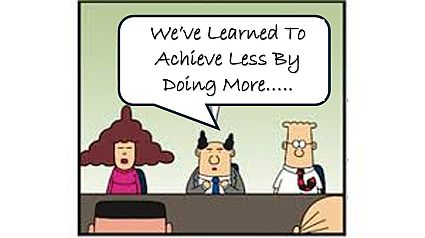In a world driven by efficiency, it’s heresy to advocate anything but getting more done in less time.
For years, we’ve been obsessed with efficiency. We’ve restructured workflows, leveraging factory models to improve the efficiency at every sales workstation. We implemented processes, methodologies, and technologies that enable us to complete more activities in less time. And, now, AI/LLMs enable us to amplify those activities endlessly.
This might be great if all these highly efficient activities were the outcomes expected. But they aren’t, while our efficiency is skyrocketing, the number of activities we can execute in any period of time is scaling, exponentially, the results are falling at a far faster rate. You’ve seen the data in prior posts or in the research reports.
The more we focus on efficiency improvement, the more we sacrifice in producing the desired outcomes. We are efficiently ineffective.
As if that isn’t discomforting enough, the way we address these challenges requires us to be very inefficient in the short term!
What does this mean?
We have to take time to understand what’s happening, why are we failing to produce what we hope to produce? What’s changed? What might we do differently? We have to get underneath the data, understand what it means, what underlies our inability to produce that which we hope to achieve. What’s causing our failure to produce what we need?
As we assess these issues, we have to start figuring out what we do about changing performance. We identify new methods and approaches, perhaps new programs, perhaps we need to restructure our GTM approaches. Then we have to introduce the changes to our sellers, break old habits, create new ones. It’s slow going, at first. We may make mistakes, we may have to adjust our strategies, reintroducing these to the sellers, getting them to build their capabilities to achieve the goals.
And we build for this consistent execution over time.
As clean and efficient as we may want to be in these initiatives, in reality there’s a lot of backing and filling, there’s a lot of adjustment and learning. And it is very inefficient!
But until we are producing the outcomes we expect, consistently, our focus on efficiency actually plays against us.
Then when we have it figured out, when we are consistently producing what we need, then we focus on efficiency. Can we continue to achieve the results we need, but can we do it more efficiently? But all these efforts have to be measured by maintaining or improving effectiveness!
If we want to be effective, we have to first be inefficient!

Leave a Reply